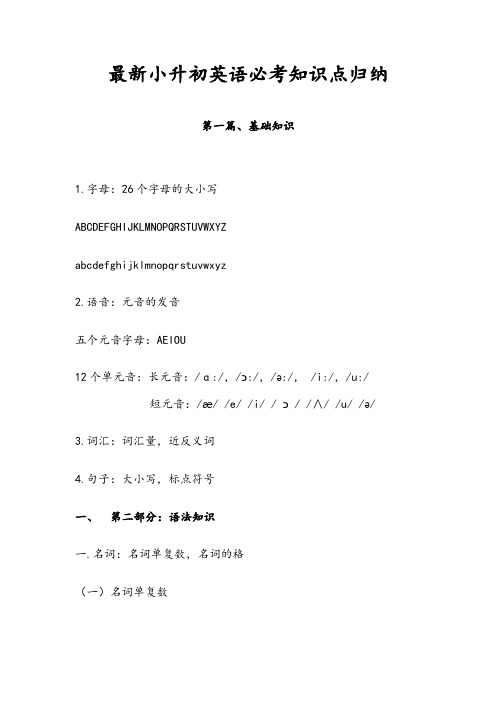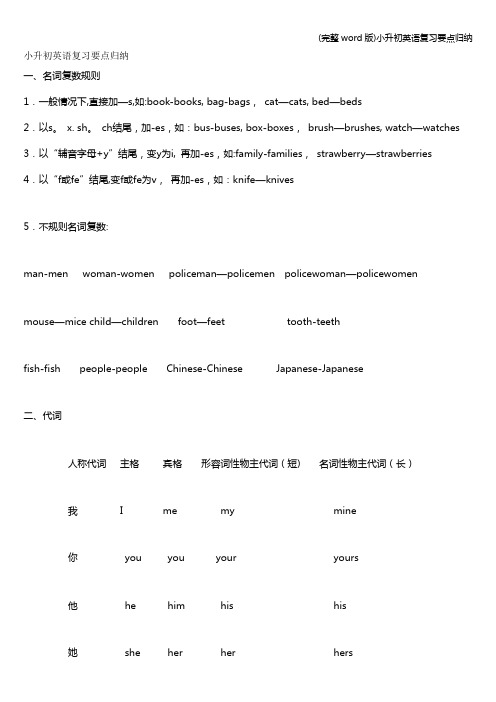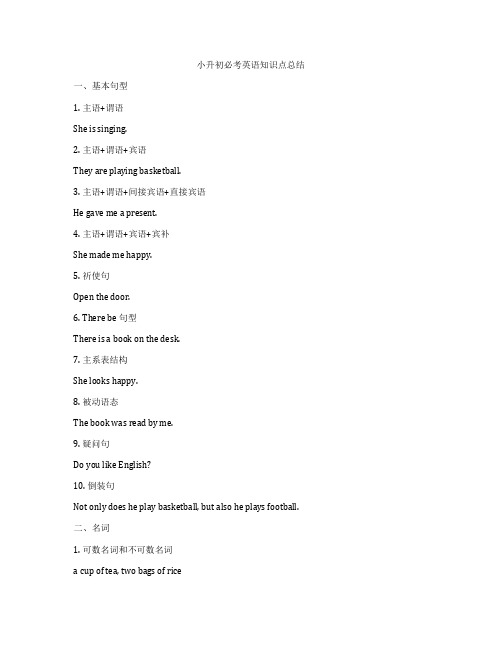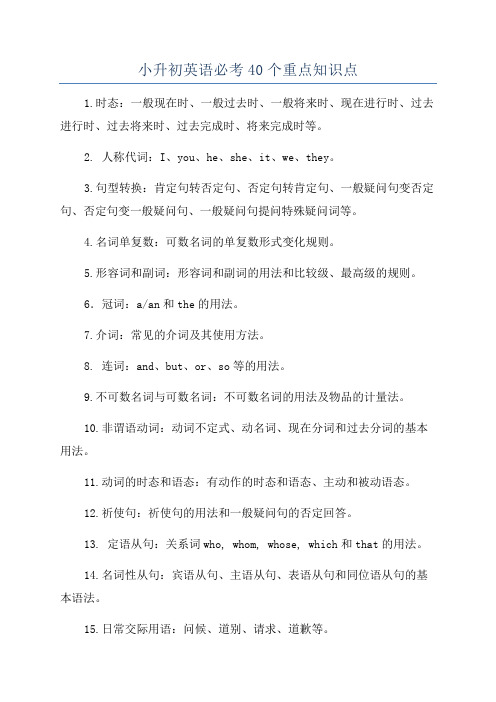(完整)小升初英语知识点归纳总结(免费下载),推荐文档
小升初必背英语单词(归纳总结版)

六年级四会词汇建议颜色颜色colour (color) 红red 黄yellow 蓝blue 绿green 黑black紫purple 白white 橙色orange 粉红pink 棕色brown水果水果fruit 苹果apple 梨子pear 桔子orange 香蕉banana 柠檬lemon西瓜watermelon 葡萄grape 菠萝pineapple 桃子peach 草莓strawberry食物食物food 饮料drink 水water 茶tea 橙汁orange 可乐cola 牛奶milk 汤soup冰激凌ice-cream 米饭rice 面条noodles 面包bread 蛋糕cake 饼干cookies糖果candy 棒棒糖lollipop 巧克力chocolate 汉堡hamburger 三明治sandwich比萨pizza 热狗hot dog 沙拉salad 鸡蛋egg 爆米花pop-corn 炸薯条French fries猪肉pork 鱼肉fish 牛肉beef 鸡肉chicken 奶酪cheese 奶油cream黄油butter 蔬菜vegetable 土豆potato 西红柿tomato交通工具飞机plane 火车train 公共汽车bus 自行车bicycle (bike) 轿车car轮船ship小船boat 出租车taxi动物动物animal 熊bear 老虎tiger 猴子monkey 大熊猫panda斑马zebra长颈鹿giraffe 鹿deer 蛇snake 狮子lion 狐狸fox 青蛙frog兔子rabbit马horse 绵羊sheep 山羊goat 奶牛cow 鸭子duck 母鸡hen 公鸡rooster鸟bird 猫cat 狗dog 猪pig 老鼠rat (mouse/mice) 大象elephant 狼wolf蜜蜂bee 蝴蝶butterfly运动运动sport 篮球basketball 足球football 排球volleyball 羽毛球badminton网球tennis 乒乓球table tennis 棒球baseball 滑雪skiing 滑冰ice skating登山climbing 游泳swim 跳水diving 跑步running跳高high jump天气天气weather 晴天sunny 阴天cloudy 雨天rainy 刮风天windy 下雪天snowy季节季节season (in)春季spring 夏季summer 秋季autumn冬季winter文具书包schoolbag (bag) 文具盒pencil-box 文具袋pencil case 尺子rule钢笔pen铅笔pencil 报纸newspaper 纸paper 书book 橡皮擦eraser 胶水glue water蜡笔crayon形状形状shape 大big 小small 高tall 矮short 胖fat 瘦thin 厚thick 薄thin长long 短short 圆形circle 星形star 心形heart学科语文Chinese 数学math 英语English 美术art 音乐music 体育P.E.计算机computer 艺术art职业教师teacher 医生doctor 护士nurse 警察policeman 司机driver工人worker 农民farmer 飞行员pilot 宇航员astronaut 舞蹈家dancer歌唱家singer 学生student 老板boss 兽医vet 工程师engineer家庭成员男人man 女人woman 孩子child (children) 婴儿baby男孩boy 女孩girl爷爷grandfather (grandpa) 奶奶grandmother (grandma)爸爸father (dad/daddy)妈妈mother (mum/mom/mummy) 姨妈/姑妈aunt 叔叔/舅舅uncle 兄弟brother姐妹sister 儿子son 女儿daughter星期星期week (on)星期一Monday 星期二Tuesday 星期三Wednesday星期四Thursday星期五Friday 星期六Saturday 星期日Sunday周末weekend国家国家country 中国China 美国America 英国Britain (England) 日本Japan加拿大Canada身体部位身体body 头head 头发hair 脸face 鼻子nose 耳ear 嘴mouth 牙tooth眼eye 手hand 手臂arm 肩shoulder 腿leg 脚foot衣物外套coat 衬衣shirt 领带tie 帽子hat(cap) 毛衣sweater 夹克jacket连衣裙dress 短裙skirt 牛仔裤jeans 短裤shorts 长裤trousers (pants)袜子socks 鞋shoes 运动鞋sport shoes 手套gloves建筑房子house 房间room 客厅living room 卫生间bathroom 卧室bedroom厨房kitchen 花园garden 公园park 餐厅dining room地点家home 学校school 操场playground 教室classroom医院hospital动物园zoo 书店book store 超市supermarket 电影院movie theater (cinema)剧场theater 银行bank 图书馆library 博物馆museum公共汽车站bus stop饭店restaurant 厕所toilet 办公室office家具桌子table 课桌desk 椅子chair 黑板backboard 窗户window 门door 床bed地板floor 沙发sofa 书架book case(shelf)日常用品电视television 灯light 台灯lamp 收音机radio 录音机tape recordertelephone 照相机camera 图片picture 钟clock相片photo雨伞umbrella 杯子cup 玻璃杯glasses 刀knife 盘子plate (dish)碗bowl 地图map 信letter 盒子box 手表watch情绪高兴的happy 悲哀的sad 生气的angry 疲劳的tired 害怕的scared 害羞的shy动词跑run 跳jump 走walk 爬climb 游泳swim 听listen 说say (talk)读read 写write 看look(watch/see) 唱sing 跳舞dance睡sleep 去go来come 画draw(paint) 玩play 洗wash 吃eat 喝drink 站stand 坐sit骑ride 学习study 喜欢like 爱love 请please 想要want 教teach帮助help 停止stop 放置put 买buy 问ask 工作work自然树tree 草grass 花flower 太阳sun 月亮moon 海sea 云cloud 风wind山hill (mountain) 星星star 天空sky 湖lake 河流river数字1——20one two three four five six seven eight nine ten eleven twelve thirteen fourteen fifteen sixteen seventeen eighteen nineteen twenty时间时间time 昨天yesterday 今天today 明天tomorrow 上午morning 下午afternoon白天day 晚上evening 深夜night代词我I 你you 他he 她she 它it 我们we 你们you 他们(她们、它们)they我的my 你的your 他的his 她的her 它的its 我们的our 你们的your他们的(她们的、它们的)their方位介词在… 里面in 在… 上面on 在… 下面under 在… 旁边beside (next to).. 附近near.在....后面behind 在... 之间between..and...在. 前面i.fron.of在…at其它好的good 坏的bad 左left 右right 钱money 聚会party 礼物gift (present)饿hungry 渴thirsty 一些some 甜sweet 新的new 旧的old 早early 迟到late快fast 慢slow 赶快hurry 高兴happiness (joy) 故事story 家庭family作业homework 游戏game 来自…be from…六年级四会短语建议吃早餐eat(have) breakfast 吃午餐eat lunch 吃晚餐eat dinner上学go to school 回家go home 做作业do one’s homework看电视watch TV 踢足球play football 作游戏play games散步go our for a walk 乘公交车by bus 骑自行车by bike步行on foot 在左/右边on the left/right 在…前面in the front在周末in the weekend 睡觉go to sleep 起床get up看电影see a movie 去电影院go to a movie 看病see a doctor 在家at home 读书read a book 写信write a letter 听音乐listen to music 在上午in the morning 在夜里at night每周一次once a week 每周两次twice a week 出去go out六年级四会句子建议1.What’.you.nam.........M.nam.i.…2.What’.his.he.nam........His.He.nam.is…3.What’.you.father’s.mother’s.teacher’.name…His/ Her name is …4.Ho.ol.ar.yo..........I’..year.old.5.Ho.ol.i.he.sh.........He.Sh.i.…6.Ho.ar.yo........... I’.fine.Than.you.7.Wha.clas.ar.yo.i........I’.i.Clas.One.Grad.Six.8.Wha.colou.i.i..........It’.red.(…)9.What’.thi............It’..(an)…10.What’.tha............It’..(an.…11.Wha.ar.these\thos....... The.ar.shoes.12.Wha.d.yo.wan........ .wan..…13.What’.you.favorit.colou.... M.favorit.colou.is..14.What’.you.favorit.foo.....M.favorit.foo.i.…15.What’.you.favorit.subjec....M.favorit.subjec.is…16.Wha.ca.yo.se..........ca.se.a…17.Ho.muc.i.i..........It’..yuan.18.Ho.muc.ar.the........ The.ar..yuan.19.What’.you.father.mothe..... He.Sh.i..…20.Wha.ar.yo.doin........ I’.readin..book.21.What’.22.Wh.i.thi............Thi.i.Mr..Mr.Green.23.Wh.i.tha............That’.Ken.24.Wh.ar.yo........... I’.Amy.25.Wher.ar.yo.......... I’.here.26.Wh.ar.the...........The.ar.…27.Wher.i.An.......... Sh.i.i.th.room.28.Wher.i.m.pe......... It’.i.th.desk.29.Wher.ar.m.sock........The.ar.o.th.chair.30.Wher.ar.the.......... The.ar.i.th.classroom.31.Wher.ar.m.shoe........ They’r.unde.th.chair.32.Ar.yo.An............Yes..am..No.I’.not.33.What’.th.weathe.lik.......It’.fine.34.Wha.tim.i.i.......... It’.on.o’clock.34.Wha.tim.d.yo.g.t.schoo.... .g.t.schoo.a.eigh.o’clock.35.Wha.ca.yo.d...........ca.swim.36.Wha.ca..bir.d......... I.ca.fly.37.Let’.go.(…)38.That’.OK.39.Thi./Tha./I.i..(an.…40.These.Those.The.ar.…41.Stan.up.42.Si.down.43.Her.yo.are.44.Than.you.45.Yo.ar.welcome..here.47..lik. …48..don’.lik.…49.Goo.morning.(afternoon.evening.night)50.Goodbye!六年级句型转换建议将句子转换为否定句和一般疑问句1. ..a............. .2.Yo.ar.…3.H.i............. .4.Sh.i.…5.I.i.............. .6.W.ar.…7.The.ar............ .8.Thi.i..(an. .9.Tha.i..(an........... .10.Thes.ar.…11.Thos.ar............ .12.Ther.i..(an.…13.Ther.ar............ .14..ca.…15.Yo.ca............ .16.H.ca.…17.Sh.ca............ .18.W.ca..19.The.ca............ .20.I’.goin.t.…21..wan............. .22.The.wan.…23.H.want............ .24.Sh.want.…25..lik............. .26.W.lik.…27.H.like............ .28.Sh.like.…29..g.t.schoo.b.bus....... .30.H..Sh.goe.t.schoo.o.foot.。
最新小升初英语必考知识点归纳

最新小升初英语必考知识点归纳第一篇、基础知识1.字母:26个字母的大小写ABCDEFGHIJKLMNOPQRSTUVWXYZ abcdefghijklmnopqrstuvwxyz2.语音:元音的发音五个元音字母:AEIOU12个单元音:长元音:/ɑ:/,/ɔ:/,/ə:/, /i:/,/u:/短元音:/æ/ /e/ /i/ / ɔ/ /∧/ /u/ /ə/3.词汇:词汇量,近反义词4.句子:大小写,标点符号一、第二部分:语法知识一.名词:名词单复数,名词的格(一)名词单复数1.一般情况,直接加-s,如:book-books, bag-bags, cat-cats, bed-beds2.以s. x. sh. ch结尾,加-es,如:bus-buses, box-boxes, brush-brushes, watch-watches3.以“辅音字母+y”结尾,变y为i, 再加-es,如:family-families, strawberry-strawberries4.以“f或fe”结尾,变f或fe为v, 再加-es,如:knife-knives 5.不规则名词复数:man-men, woman-women, policeman-policemen, policewoman-policewomen, mouse-micechild-children, foot-feet, tooth-teeth, fish-fish, people-people, Chinese-Chinese, Japanese-Japanese不可数名词的复数就是原型: paper, juice, water, milk, rice, tea(二)名词的格(1) 有生命的东西的名词所有格:a)单数后加’s 如: Lucy’s ruler my father’s shirtb)以s 结尾的复数名词后加’如: his friends’ bagsc)不以s 结尾的复数后加’s children’s shoes●并列名词中,如果把’s加在最后一个名词后,表示共有, 如:Tom and Mike’s car 汤姆和迈克共有的小汽车●要表示所有物不是共有的,应分别在并列名词后加’sTom’s and Mike’s cars 汤姆和麦克各自的小汽车(2)表示无生命东西的名词通常用“ of +名词”来表示所有关系:如:a picture of the classroom a map of China二.冠词:不定冠词,定冠词种类:(1)不定冠词:a / an a unit / an uncle元音开头的可数名词前用an :an egg / an apple / an orange / an eraser / an answer / an ID card / an alarm clock / an actor / an actress / an e-mail / an address / an event / an example / an opera / an houran old man / an interesting book / an exciting sport / an action movie / an art lesson /(2)定冠词:the the egg the plane2. 用法:定冠词的用法:(1)特指某(些)人或某(些)物: The ruler is on the desk. (2)复述上文提到的人或物:He has a sweater. The sweater is new. (3)谈话双方都知道的人或物:The boys aren’t at school.(4)在序数词前:John’s birthday is February the second.(5)用于固定词组中: in the morning / afternoon / evening 不用冠词的情况:(1)专有名词前:China is a big country.(2)名词前有定语:this , that , my , your , some, any , no 等:This is my baseball.(3)复数名词表示一类人和事:Monkeys can’t swim. They are teachers.(4)在节日,日期,月份,季节前:Today is Christmas Day. It’s Sunday.(5)一日三餐前:We have breakfast at 6:30.(6)球类棋类运动前:They often play football after class. He plays chess at home.* 但乐器前要用定冠词:I play the guitar very well.(7)学科名称前:My favorite subject is music.(8)在称呼或头衔的名词前:This is Mr Li.(9)固定词组中:at noon at night by bus三、代词:人称代词,物主代词人称代词物主代词主格宾格第一单数I(我)me my(我的)人称复数we(我们)us our(我们的)第二人称单数you(你)you your(你的)复数you(你们)you your(你们的)第三人称单数he(他)him his(他的)she(她)her her(她的)it(它)it its(它的)复数they(他们/她们/它们)themtheir(他们的/她们的/它们的)四、形容词,副词:比较级,最高级(一)、形容词的比较级1、形容词比较级在句子中的运用:两个事物或人的比较用比较级,比较级后面一般带有单词than。
(完整word版)小升初英语复习要点归纳

小升初英语复习要点归纳一、名词复数规则1.一般情况下,直接加—s,如:book-books, bag-bags,cat—cats, bed—beds2.以s。
x. sh。
ch结尾,加-es,如:bus-buses, box-boxes,brush—brushes, watch—watches 3.以“辅音字母+y”结尾,变y为i, 再加-es,如:family-families,strawberry—strawberries 4.以“f或fe”结尾,变f或fe为v,再加-es,如:knife—knives5.不规则名词复数:man-men woman-women policeman—policemen policewoman—policewomenmouse—mice child—children foot—feet tooth-teethfish-fish people-people Chinese-Chinese Japanese-Japanese二、代词人称代词主格宾格形容词性物主代词(短) 名词性物主代词(长)我I me my mine你you you your yours他he him his his我们we us our ours你们you you your yours他们they them their theirs 口诀:主格应该作主语,放在句子的开头;宾格应该作宾语,放在动词介词后;形容词性的物主代词不能单独用,必须接名词或其他词;名词性的物主代词,单独使用就可以。
如:I am a student.What is your name?His bag is on the desk. That one is not his.Let me help you.These shoes are nice。
Try them on.They are drinking tea。
三、动词1。
be动词:am is are2. 普通动词:have go come take get buy passsit stand have talk walk see catch put等。
小升初必考英语知识点总结

小升初必考英语知识点总结一、基本句型1. 主语+谓语She is singing.2. 主语+谓语+宾语They are playing basketball.3. 主语+谓语+间接宾语+直接宾语He gave me a present.4. 主语+谓语+宾语+宾补She made me happy.5. 祈使句Open the door.6. There be 句型There is a book on the desk.7. 主系表结构She looks happy.8. 被动语态The book was read by me.9. 疑问句Do you like English?10. 倒装句Not only does he play basketball, but also he plays football.二、名词1. 可数名词和不可数名词a cup of tea, two bags of rice2. 名词的所有格my father's car3. 名词的单复数a book, two books4. 特殊名词的复数形式child-children, woman-women5. 特殊名词的不可数名词形式news, information6. 特殊名词的复合名词形式forget-me-not, passer-by三、冠词1. 定冠词和不定冠词a book, the book2. 不加冠词的情况He is a student.3. 特殊用法once upon a time四、代词1. 人称代词I, you, he, she, it, we, they2. 物主代词my, your, his, her, its, our, their3. 反身代词myself, yourself, himself, herself, itself, ourselves, themselves 4. 特殊用法one another, each other五、动词1. 一般现在时He plays basketball every day.2. 一般过去时I played computer games yesterday.3. 一般将来时I will go to the park tomorrow.4. 现在进行时She is reading a book now.5. 过去进行时He was playing basketball at this time yesterday.6. 情态动词can, may, must, should, need7. 动词的不定式to do, to be8. 动词的-ing形式reading, playing9. 动词的完成时I have read that book.10. 动词的被动语态The book was read by me.11. 及物动词和不及物动词I like singing.六、形容词和副词1. 形容词的比较级和最高级big-bigger-biggest2. 副词的用法She sings well.3. 物主形容词my, your, his, her, its, our, their4. 特殊形容词和副词good-better-best, well-better-best七、介词1. in, on, at的用法in the classroom, on the desk, at home2. 特殊介词的用法under, over, between, among3. 介词短语in front of, next to, to the left of4. 介词词组on time, in time八、连词1. and, but, or的用法She likes playing basketball and football.2. because, so的用法He is tired because he works hard.3. 特殊连词的用法either...or, neither...nor, not only...but also...九、数词1. 基数词和序数词one, first2. 特殊数词的用法the first of October, one and a half 3. 特殊用法three times a week, two hours' time十、时间1. 日常时间的表达at seven o'clock, in the morning2. 一般现在时表示的未来情况I leave for Beijing tomorrow.3. 特殊时间状语的用法last Sunday, next Tuesday十一、情态动词1. can, may, must, shouldI can swim.2. 特殊情态动词的用法would like, need3. 特殊用法had better, have to十二、虚拟语气1. if引导的虚拟条件句If I were you, I would go now.2. wish引导的虚拟句I wish I were a bird.3. 特殊用法It's high time, If only十三、疑问句和感叹句1. 一般疑问句Do you like English?2. 特殊疑问句What's your name?3.感叹句What a nice day it is!四、定语和被定语1. 定语的位置和形式the red book, the book on the desk2. 被定语的位置和形式a city of the world, a boy with big eyes3. 特殊用法a cup of tea, the mother of all rivers 十五、主谓一致1. 就近原则Neither she nor I am good at singing.2. 特殊用法There be 句型十六、宾语从句1. 特殊宾语从句的引导词I know who the man is.2. 特殊宾语从句的时态I think he will come soon.十七、主语从句1. 特殊主语从句的引导词What you have said is true.2. 特殊主语从句的时态It's clear that they have won the game. 十八、定语从句1. 特殊定语从句的引导词The boy who is swimming is my friend.2. 特殊定语从句的时态I have lost the pen that you gave me.十九、状语从句1. 时间状语从句When the bell rang, we stopped working.2. 地点状语从句Where there is a will, there is a way.3. 原因状语从句Because he was ill, he didn't go to work.4. 条件状语从句If I were you, I would go now.5. 结果状语从句It's so late that we can't go out.六、语音1. 单词中元音的发音cake, team2. 单词中辅音的发音break, cream3. 单词重读音节的规律beautiful, comfortable4. 特殊音标的发音ai, ee, th七、词汇1. 同义词happy-glad, big-large2. 反义词happy-sad, big-small3. 同音词see-sea, for-four4. 词根act, behave5. 词缀happy-unhappy, Sunday-weekend 8、语法1. 句子成分的转换He doesn't like playing basketball. Playing basketball is not liked by him.2. 句子类型的转换She can swim. - Can she swim?十九、阅读1. 阅读理解阅读短文,回答问题。
小升初英语必考10个知识点归纳总结

小升初英语必考10个知识点归纳总结
1.词汇量扩充:小升初英语试卷中常常涉及生活、学校、家庭、动物、食物等常见话题的词汇,因此一定要扩充自己的词汇量,并能够正确运用。
2.语法知识:必须掌握基本的英语语法知识,例如主谓一致、动词时态、副词形式等。
3.单词拼写:在考试中,会有一些单词的拼写要求,因此需要牢记常
见单词的拼写。
4.阅读理解:阅读理解是小升初英语试卷中的重要部分,需要学会快
速阅读并理解文本内容,答题时要注意细节。
5.时态转换:小升初英语试卷中常常涉及时态转换,例如改写句子、
填空等题型,需要熟悉各种时态的用法。
6.句子结构:必须掌握一些常见的句子结构,例如倒装句、强调句、
被动句等。
7.写作技巧:在英语试卷中,可能会有一些写作题目,需要学会正确
地组织语言,表达自己的观点和想法。
8.数字和日期表达:在英语试卷中,会涉及数字和日期的表达,因此
需要学会读写数字和日期的方式。
9.交际用语:必须掌握一些常见的交际用语,例如问候、道歉、邀请等,可以更加流利地与他人进行交流。
10.高频词汇:要掌握一些高频词汇,例如表示时间、表示数量、表
示比较等常用词汇,能够灵活应用在答题中。
总结:以上是小升初英语必考的10个知识点的归纳总结。
在备战小升初英语考试时,学生应该扩充词汇量,掌握基本的语法知识,熟悉单词的拼写,提高阅读理解能力,熟悉时态转换,了解常见的句子结构,掌握写作技巧,熟练表达数字和日期,熟悉交际用语,掌握一些高频词汇。
只有全面掌握这些知识点,才能更好地应对小升初英语考试。
小升初英语必考40个重点知识点

小升初英语必考40个重点知识点1.时态:一般现在时、一般过去时、一般将来时、现在进行时、过去进行时、过去将来时、过去完成时、将来完成时等。
2. 人称代词:I、you、he、she、it、we、they。
3.句型转换:肯定句转否定句、否定句转肯定句、一般疑问句变否定句、否定句变一般疑问句、一般疑问句提问特殊疑问词等。
4.名词单复数:可数名词的单复数形式变化规则。
5.形容词和副词:形容词和副词的用法和比较级、最高级的规则。
6.冠词:a/an和the的用法。
7.介词:常见的介词及其使用方法。
8. 连词:and、but、or、so等的用法。
9.不可数名词与可数名词:不可数名词的用法及物品的计量法。
10.非谓语动词:动词不定式、动名词、现在分词和过去分词的基本用法。
11.动词的时态和语态:有动作的时态和语态、主动和被动语态。
12.祈使句:祈使句的用法和一般疑问句的否定回答。
13. 定语从句:关系词who, whom, whose, which和that的用法。
14.名词性从句:宾语从句、主语从句、表语从句和同位语从句的基本语法。
15.日常交际用语:问候、道别、请求、道歉等。
16.宾语:及物动词后面的宾语和介词后面的宾语。
17.数词:数字和序数词的用法。
18.频率副词:频率副词的位置和用法。
19. 情态动词:can、could、may、might等的用法。
20.反意疑问句:反意疑问句的构成和回答方式。
21.祈使句和陈述句的句型转换。
22.简单句和复合句的句型转换。
23.状语从句:时间、地点、方式等状语从句的用法。
24.英语字母和大小写的用法规则。
25.数字和时间的表达方法。
26.祈使句、感叹句和陈述句的区别。
27.人称代词和形容词性物主代词的用法。
28.祈使句的否定形式的构成和用法。
29.独立主格结构:独立主格结构的基本句型和用法。
30.定语从句和名词性从句的结构和区别。
31.特殊疑问句:特殊疑问句的基本用法和回答方式。
小升初知识点总结复习(素材)通用版英语六年级下册
一、必会单词
国家类 China 中国 Canada 加拿大
Australia 澳大利亚 USA UK 英国
城市类 London 伦敦 Moscow 莫斯科 Singapore 新加坡
语言类 Chinese 汉语 English 英语
Fresh 法语
Sydney 悉尼
科目类 Chinese 语文 maths 数学 dancing class 舞蹈课 art 美术 music 音乐
go cycling 去骑自行车
in front of 在...前面
fly a kite 放风筝
lots of 很多
go boating 去划船
eat breakfast 吃早饭
go straight 直走
eat lunch 吃午饭
have a cold 感冒
eat dinner 吃晚饭
pay attention to 留意
science 科学 P.E.体育 cooking class 烹饪课
puter class 电脑课
星期类 Sunday 星期日
Monday 星期一 Tuesday 星期二 Wednesday 星期三
Thursday 星期四 Friday 星期五
Saturday 星期பைடு நூலகம் weekend 周末
January 一月 February 二月 March 三月 April 四月
tall 高的 short 矮的 fat 胖的 thin 瘦的 healthy 健康的 good 好的
外貌类 beautiful 美丽的 pretty 美丽的 nice 好的 strong 强壮的 old 老的
(word完整版)小升初英语单词分类汇总大全(最全),推荐文档
December
[di'sembə]
十二月
Monday
['mʌndi]
星期一
Friday
['fraidi]
星期五
Tuesday
['tju:zdi]
星期二
Saturday
['sætədi]
星期六
Wednesday
['wenzdeɪ]
星期三
Sunday
['sʌndi]
星期天
Thursday
['θə:zdi]
[piŋk]
粉红
数词类
one
[wʌn]
一
first
[fə:st]
第一
two
[tu:]
二
second
['sekənd]
第二
three
[θri:]
三
third
[θə:d]
第三
four
[fɔ:]
四
fourth
[fɔ:θ]
第四
five
[faiv]
五
fifth
[fifθ]
第五
six
[siks]
六
sixth
[siksθ]
十二
thirty
['θə:ti]
三十
thirteen
['θə:'ti:n]
十三
forty
['fɔ:ti]
四十
fourteen
['fɔ:'ti:n]
十四
fifty
['fifti]
五十
fifteen
小升初总复习英语知识要点【打印版】
小升初总复习英语知识要点-、小学英语字母部分基础知识小结1.元音字母:a e i o u2字母须大写的几种情况。
(1)句子开头的字母须大写。
如:What's your name? My name is Jim.(2)句子中直接引语的开头字母须大写。
如:Sam says " Touch your nose" .(3)位千人名姓氏之前,表示亲属关系的词,其开头的字母须大写。
如:Uncle Sam, Aunt Polly.当谈到父母father(dad)或mother(mum)前不必用my或your修饰时,如:Hi, Mum! Hi, Dad!(4)表示国名和语言的词,其开头的字母须大写。
如:Chinese English Canadian America(5)位于姓名前的称呼、职称的首字母须大写。
如:Dr. Li Miss Wang ML Zhang(6)信中称呼的开头字母须大写,信尾表示敬意的客套用语的开头字母须大写。
如:Dear Mum Love Lucy(7)人名、地名、国名、重要建筑物等常用名词的首字母须大写。
如:Alice Beijing China the Great Wall(8)一周七日的名称、月份名称、节日名称等,其开头的字母须大写。
如:Mond ay May Teachers'Day(9)表示“我”的字母"I"永远大写。
如:I am Tony. Mru-y and I are friends.(10)特指的学校、政府、党派、委员会或涉及具体人名的称呼或职位,其首字母大写。
如:Wisdom Middle School Young Pioneer Grandma Zhang(11)某些特殊词汇、缩略词、标志语、特殊用语等,首字母大写或全大写。
如:I'm OK. Merry Christmas!(12)诗的每一行首字母要大写。
小学英语小升初复习重点知识汇总(共39类)
小学英语重点知识汇总01.现在进行时表示正在发生的事情或进行的动作,常与now, listen, look等词连用,结构是主语+be动词(am, is, are) + 动词 ing.如:It is raining now.外面正在下雨It is six o' clock now.现在6点了My parents are reading newspapers in the sitting room.我父母正在客厅看报纸Look! The children are having a running race now.看!孩子们正在赛跑问句将be动词移前,否定句在be动词后+not.02. 一般现在时表示经常反复发生的事情或动作,常与often, usually, sometimes, always, every day (week year***) on Sundays 等词连用。
结构是主语+动词原形;当主语为第三人称单数即he, she, it, Tom, my mother, the boy 等词时,动词后加s或es.如:We have an English lesson every day.我们每天都要上英语课Do the boys run faster than the girls? Yes, they do.男孩比女孩跑的快吗?是的问句借助于do, does否定句借助于don' t, doesn, t,后面动词一定要还原。
03. 一般过去时表示发生在过去的事情或存在的状态,常与just now; a moment ago; ••• ago; yesterday; last ( week; month; year; Monday; weekend) ; this morning 等词连用。
结构是主语+be动词的过去式(was; were)或主语+动词的过去式。
注意:be动词与动词过去式不可同时使用。
- 1、下载文档前请自行甄别文档内容的完整性,平台不提供额外的编辑、内容补充、找答案等附加服务。
- 2、"仅部分预览"的文档,不可在线预览部分如存在完整性等问题,可反馈申请退款(可完整预览的文档不适用该条件!)。
- 3、如文档侵犯您的权益,请联系客服反馈,我们会尽快为您处理(人工客服工作时间:9:00-18:30)。
小学英语知识点汇总一、名词复数规则1.一般情况下,直接加-s,如:book-books, bag-bags, cat-cats, bed-beds2.以s. x. sh. ch结尾,加-es,如:bus-buses, box-boxes, brush-brushes, watch-watches3.以“辅音字母+y”结尾,变y为i, 再加-es,如:family-families, strawberry-strawberries4.以“f或fe”结尾,变f或fe为v, 再加-es,如:knife-knives5.不规则名词复数: man-men, woman-women, policeman-policemen, policewoman-policewomen, mouse-micechild-children foot-feet,.tooth-teeth fish-fish, people-people, Chinese-Chinese, Japanese-Japanese写出下列各词的复数I _________him _________this ___________her ______watch _______child_______photo ________diary ______day________ foot________ book_______ dress ________tooth_______ sheep______box_______ strawberry _____peach______ sandwich ______dish_______bus_______man______ woman_______二、一般现在时1.一般现在时表示经常或习惯性的动作,也可表示现在的状态或主语具备的性格和能力。
2.一般现在时中,没有be动词和情态动词,主语为第三人称单数的肯定句,动词要按规则加上s,主语是非第三人称单数的肯定句,动词用原形。
3.在一般现在时中,句中有be动词或情态动词时,否定句在be动词和情态动词后加not,一般疑问句将be动词或情态动词放在句首。
4.在一般现在时中,句中没有be动词或情态动词时,主语为第三人称单数的否定句在动词前加does+not (doesn’t),一般疑问句在句首加does,句子中原有动词用原形;主语为非第三人称单数,否定句用do+not (don’t),一般疑问句在句首加do,句子中动词用原形。
动词+s的变化规则1.一般情况下,直接加-s,如:cook-cooks, milk-milks2 .以s. x. sh. ch. o结尾,加-es,如:guess-guesses, wash-washes, watch-watches, go-goes3.以“辅音字母+y”结尾,变y为i, 再加-es,如:study-studies一般现在时基本用法介绍【No. 1】一般现在时的功能1.表示事物或人物的特征、状态。
如:The sky is blue.天空是蓝色的。
2.表示经常性或习惯性的动作。
如:I get up at six every day.我天天六点起床。
3.表示客观现实。
如:The earth goes around the sun.地球绕着太阳转。
一般现在时的构成1. be动词:主语 be(am,is,are) 其它。
如:I am a boy.我是一个男孩。
2.行为动词:主语行为动词( 其它)。
如:We study English.我们学习英语。
当主语为第三人称单数(he, she,it)时,要在动词后加"-s"或"-es"。
如:Mary likes Chinese.玛丽喜欢汉语。
【No. 2】一般现在时的变化1. be动词的变化。
否定句:主语 be not 其它。
如:He is not a worker.他不是工人。
一般疑问句:Be 主语其它。
如:-Are you a student?-Yes. I am. / No, I'm not.非凡疑问句:疑问词一般疑问句。
如:Where is my bike? 2.行为动词的变化。
否定句:主语 don't( doesn't ) 动词原形( 其它)。
如:I don't like bread.当主语为第三人称单数时,要用doesn't构成否定句。
如: He doesn't often play.一般疑问句:Do( Does ) 主语动词原形其它。
如:- Do you often play football?- Yes, I do. / No, I don't.当主语为第三人称单数时,要用does构成一般疑问句。
如: - Does she go to work by bike?- Yes, she does. / No, she doesn't.2.行为动词的变化。
否定句:主语 don't( doesn't ) 动词原形( 其它)。
如:I don't like bread.当主语为第三人称单数时,要用doesn't构成否定句。
如: He doesn't often play.一般疑问句:Do( Does ) 主语动词原形其它。
如:- Do you often play football?- Yes, I do. / No, I don't.当主语为第三人称单数时,要用does构成一般疑问句。
如: - Does she go to work by bike?- Yes, she does. / No, she doesn't.动词 s的变化规则1.一般情况下,直接加-s,如:cook-cooks, milk-milks2.以s. x. sh. ch. o结尾,加-es,如:guess-guesses, wash-washes, watch-watches, go-goes3.以“辅音字母y”结尾,变y为i, 再加-es,如:study-studies用括号内动词的适当形式填空。
1. He often ________(have) dinner at home.2. Daniel and Tommy _______(be) in Class One.3. We _______(not watch) TV on Monday.4. Nick _______(not go) to the zoo on Sunday.5. ______ they ________(like) the World Cup?6. What _______they often _______(do) on Saturdays?7. _______ your parents _______(read) newspapers every day?8. The girl _______(teach) us English on Sundays.9. She and I ________(take) a walk together every evening.10. There ________(be) some water in the bottle.11. Mike _______(like) cooking.12. They _______(have) the same hobby.13. My aunt _______(look) after her baby carefully.14. You always _______(do) your homework well.15. I _______(be) ill. I’m staying in bed.16. She _______(go) to school from Monday to Friday.17. Liu Tao _______(do) not like PE.18. The child often _______(watch) TV in the evening.19. Su Hai and Su Yang _______(have) eight lessons this term.20. -What day _______(be) it today?- It’s Saturday三、现在进行时1.现在进行时表示现在正在进行或发生的动作,也可表示当前一段时间内的活动或现阶段正在进行的动作。
2.现在进行时的肯定句基本结构为be+动词ing.3.现在进行时的否定句在be后加not。
4.现在进行时的一般疑问句把be动词调到句首。
5.现在进行时的非凡疑问的基本结构为:疑问词不达意 be 主语动词ing?但疑问词当主语时其结构为:疑问词不达意 be 动词ing?动词加ing的变化规则1.一般情况下,直接加ing,如:cook-cooking2.以不发音的e结尾,去e加ing,如:make-making, taste-tasting3.如果末尾是一个元音字母和一个辅音字母,双写末尾的辅音字母,再加ing,如:run-running, stop-stopping写出下列动词的现在分词:play________ run__________ swim _________make__________go_________ like________ write________ _ski___________read________ have_________ sing ________ dance_________put_________ see________ buy _________ love____________live_______ take_________ come ________ get_________stop_________ sit ________ begin________ shop___________二、用所给的动词的正确形式填空:1.The boy __________________ ( draw)a picture now.2. Listen .Some girls _______________ ( sing)in the classroom .3. My mother _________________ ( cook )some nice food now.4. What _____ you ______ ( do ) now?5. Look . They _______________( have) an English lesson .6.They ____________(not ,water) the flowers now.7.Look! the girls ________________(dance )in the classroom .8.What is our granddaughter doing? She _________(listen ) to music.9. It’s 5 o’clock now. We _____________(have)supper now10.______Helen____________(wash )clothes? Yes ,she is .四、将来时理论及练习一、概念:表示将要发生的动作或存在的状态及打算、计划或预备做某事。
